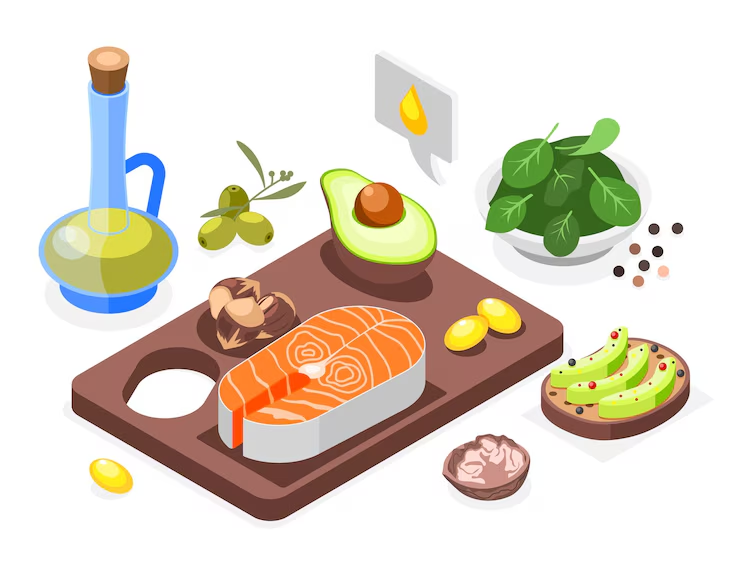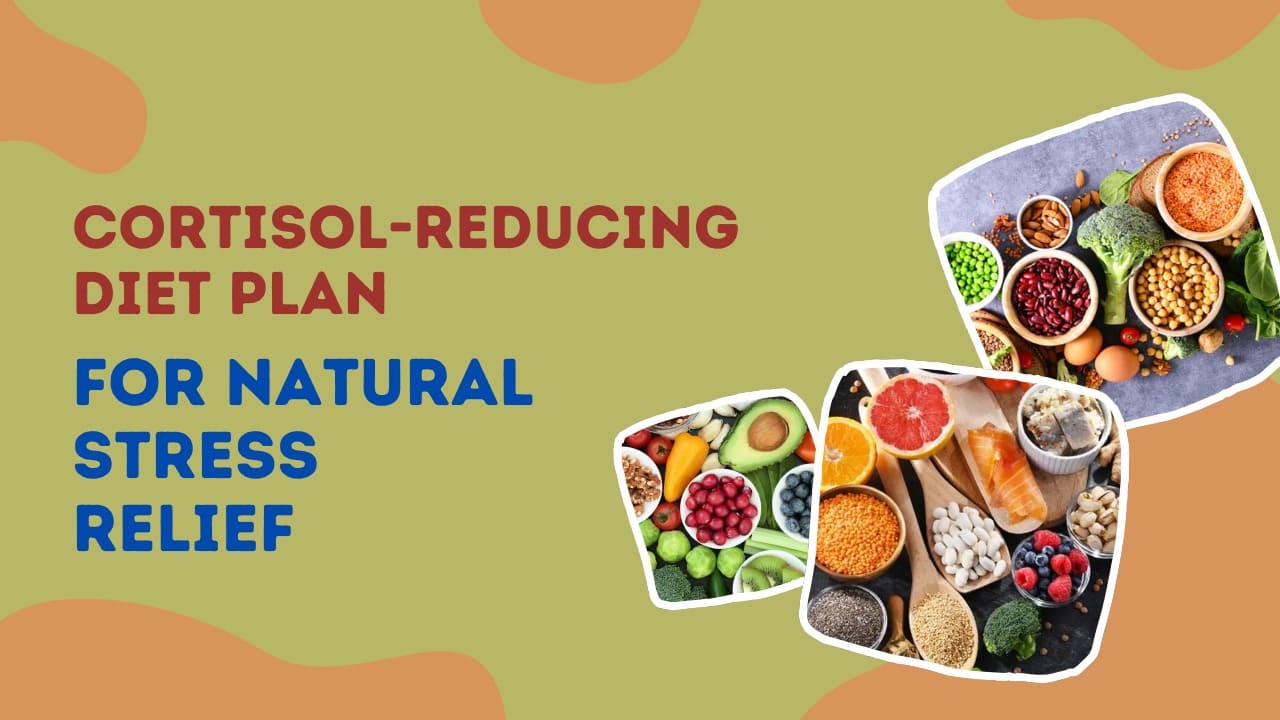Diet plan choices can significantly impact how your body handles stress. In today’s fast-paced world, chronic stress from work, personal life, and environment often keeps cortisol levels elevated. This stress hormone, while helpful in short bursts, can harm your health when consistently high—leading to fatigue, weight gain, poor sleep, and even mood swings.
Diet plan strategies focused on hormone balance are essential. A cortisol-reducing diet plan includes anti-inflammatory foods rich in vitamins and minerals. Think leafy greens, avocados, nuts, salmon, and fermented foods that support gut health. These ingredients nourish the adrenal glands and promote stable energy, helping the body cope better with stress.
Diet plan adjustments don’t need to be extreme. Small, consistent changes—like avoiding processed sugar and caffeine overload—can make a big difference. Pairing a cortisol-reducing diet plan with regular sleep, hydration, and movement builds long-term resilience and restores hormonal balance.

What is Cortisol ?
Cortisol is a hormone produced by the adrenal glands, which sit on top of your kidneys. Often referred to as the “stress hormone,” cortisol plays a vital role in helping your body respond to stress. It also regulates blood pressure, blood sugar levels, and inflammation, and supports your energy levels throughout the day.
While cortisol is essential in short bursts, chronic stress can keep levels elevated longer than necessary. This constant state can lead to negative health effects such as anxiety, weight gain—especially around the abdomen—poor sleep, and a weakened immune system. That’s why managing cortisol levels is so important for long-term well-being.
A cortisol-reducing diet plan is one of the most effective ways to keep this hormone in balance. Incorporating whole foods like leafy greens, fatty fish, berries, nuts, and fermented items supports adrenal health and calms the nervous system, reducing the impact of daily stress on your body.
Cortisol is a glucocorticoid hormone produced by the adrenal glands, located on top of your kidneys. It plays a vital role in various bodily functions:
Regulates metabolism
Controls blood sugar levels
Reduces inflammation
Assists with memory formulation
Manages how your body uses fats, proteins, and carbohydrates
Why is Cortisol Called the “Stress Hormone” ?
Cortisol is often called the “stress hormone” because it’s released in response to stress. When your brain senses a threat—physical, emotional, or mental—it signals the adrenal glands to release cortisol. This hormone increases blood sugar, boosts energy availability, and helps the body manage the “fight or flight” response.
While this response is crucial in short-term situations, chronic stress keeps cortisol levels high for too long. This can lead to anxiety, disrupted sleep, cravings for sugary foods, and even abdominal fat accumulation. That’s why understanding and managing cortisol is vital for long-term physical and mental health.
One effective strategy is following a cortisol-reducing diet plan. By fueling your body with nutrient-dense, anti-inflammatory foods like leafy greens, omega-3s, and fermented vegetables, you can help regulate cortisol naturally. Balanced meals, combined with hydration and mindful eating, support your body’s ability to stay calm and resilient under stress.
Cortisol levels rise in response to stress, both physical and emotional. In small amounts, it’s beneficial—preparing the body to deal with potential threats by increasing energy, focus, and stamina.
However, chronically high cortisol can lead to:
Weight gain (especially belly fat)
High blood pressure
Sleep disturbances
Blood sugar imbalances
Weakened immune system
Mood disorders like anxiety and depression
When and How Does Cortisol Spike ?
Cortisol levels naturally follow a daily rhythm—highest in the morning (to wake us up) and lowest at night. But certain factors can cause excess or prolonged spikes:
Chronic stress
Poor diet (high sugar, processed foods)
Lack of sleep
Overtraining without recovery
Caffeine and alcohol abuse
Thankfully, you can naturally regulate cortisol levels, and one of the most powerful tools is your diet.
How Does Diet Affect Cortisol ?
Your diet plays a powerful role in regulating cortisol levels. What you eat can either support your body’s stress response or worsen it. Consuming too many refined sugars, processed foods, or caffeine can cause blood sugar spikes and crashes—this triggers the release of cortisol as your body tries to restore balance.
On the other hand, a balanced diet helps maintain stable blood sugar and reduce inflammation, both of which keep cortisol in check. Whole foods rich in fiber, antioxidants, and healthy fats—such as leafy greens, berries, salmon, avocados, and nuts—nourish the adrenal glands and support hormone production.
Timing of meals also matters. Skipping meals or undereating can cause your blood sugar to drop, which prompts a cortisol surge to stabilize energy levels. Eating regular, nutrient-rich meals helps prevent this hormonal stress reaction.
Following a cortisol-reducing diet plan is a proactive way to support your body’s stress response. It not only lowers cortisol levels naturally but also improves mood, sleep quality, and energy. Over time, the right nutrition can build resilience against everyday stress and promote overall well-being.
The food you consume directly influences your hormonal balance, including cortisol. A cortisol-reducing diet focuses on:
Stabilizing blood sugar levels
Providing essential nutrients that support adrenal health
Reducing inflammation
Encouraging calm and relaxation through nourishment
Top Tips for a Cortisol-Reducing Diet Plan
Prioritize Whole Foods & Complex Carbohydrates

Processed and refined foods can wreak havoc on your hormones. These foods often cause rapid blood sugar spikes followed by crashes, which prompt the body to release cortisol to rebalance energy levels. Frequent consumption of such foods keeps your stress hormone elevated, leading to fatigue, irritability, and weight gain over time.
To help stabilize cortisol levels, opt for complex carbohydrates instead. Whole grains, sweet potatoes, oats, and legumes provide a slow, steady release of glucose into the bloodstream. This not only prevents sudden cortisol spikes but also supports the production of serotonin—a neurotransmitter that promotes calmness and improves mood.
Incorporating these choices into a cortisol-reducing diet plan can make a significant difference in your stress response. By focusing on nutrient-dense, fiber-rich carbs, you’re fueling your body with sustained energy and helping regulate hormones naturally. Over time, this shift can improve emotional balance, mental clarity, and overall well-being.
Best Ingredients:
Sweet potatoes
Quinoa
Brown rice
Oats
Lentils
Beans
Bananas
Benefits:
Maintains stable blood sugar
Reduces cortisol spikes
Enhances mood and energy
Pro Tip: Include a small portion of healthy carbs in your dinner to help lower nighttime cortisol and improve sleep.
Add Omega-3 Rich Foods

Omega-3 fatty acids play a vital role in managing stress and inflammation in the body. These essential fats are known for their ability to reduce the production of pro-inflammatory cytokines, which helps calm the body’s stress response. More importantly, omega-3s can directly lower cortisol and adrenaline levels, promoting a more balanced hormonal state.
Foods rich in omega-3s—such as salmon, mackerel, walnuts, chia seeds, and flaxseeds—should be staples in a cortisol-reducing diet plan. Including these regularly can help improve mood, support heart health, and reduce anxiety symptoms. They also enhance brain function, making it easier to cope with emotional and mental stress.
Integrating omega-3s into a cortisol-reducing diet plan is simple yet effective. Whether added to smoothies, salads, or cooked meals, these fats offer both nutritional and hormonal support. Over time, a consistent intake can significantly help in regulating the stress response and boosting overall resilience.
Best Ingredients:
Salmon
Mackerel
Sardines
Walnuts
Flaxseeds
Chia seeds
Benefits:
Lowers systemic inflammation
Supports brain health and mood
Reduces anxiety and stress levels
Pro Tip: Aim for at least two servings of fatty fish per week or supplement with a high-quality fish oil (under medical supervision).
Include Magnesium-Rich Foods
Magnesium is often referred to as the “relaxation mineral” for good reason. It supports over 300 biochemical processes in the body and plays a vital role in regulating the nervous system. One of its most important functions is helping the body cope with stress by reducing excessive cortisol production.
A magnesium-rich cortisol-reducing diet plan can ease tension and promote a sense of calm. Foods like spinach, pumpkin seeds, almonds, black beans, and avocados are excellent sources of magnesium. Including these in your daily meals not only supports muscle and nerve function but also helps in maintaining balanced mood and sleep patterns.
Chronic stress can lead to magnesium depletion, making supplementation or magnesium-rich foods even more crucial. By incorporating this mineral into a cortisol-reducing diet plan, you’re actively supporting your body’s ability to manage stress more effectively, reduce anxiety, and improve overall resilience in a natural and sustainable way.
Best Ingredients:
Spinach
Almonds
Pumpkin seeds
Avocados
Black beans
Dark chocolate (in moderation)
Benefits:
Promotes relaxation and sleep
Helps regulate adrenal function
Lowers blood pressure and cortisol
Pro Tip: Pair magnesium-rich foods with vitamin B6 (like bananas and chickpeas) to enhance absorption.
Eat Enough Protein (Especially in the Morning)

Skipping meals or choosing a carb-heavy breakfast can negatively impact your stress levels. When you begin your day with refined sugars or no food at all, your blood sugar may spike and then quickly crash. This sudden drop signals the body to release cortisol, the primary stress hormone, to restore balance.
One of the key principles of a cortisol-reducing diet plan is to start your morning with a protein-rich meal. Eggs, Greek yogurt, chia pudding, or a protein smoothie provide a steady stream of energy and help maintain balanced blood sugar levels. This prevents unnecessary cortisol spikes and promotes mental clarity and mood stability throughout the day.
A nourishing, balanced breakfast sets the tone for a calm, focused day. By prioritizing protein and avoiding refined carbs in the morning, a cortisol-reducing diet plan supports long-term hormone balance, improves energy levels, and helps reduce the physical and emotional effects of chronic stress.
Best Ingredients:
Eggs
Greek yogurt
Tofu or tempeh
Chicken breast
Protein-rich smoothies (with seeds, nuts, protein powder)
Benefits:
Sustains energy throughout the day
Reduces cravings and emotional eating
Supports muscle repair and hormone balance
Pro Tip: Include protein in every meal to maintain a balanced cortisol rhythm.
Stay Hydrated and Limit Caffeine
Dehydration is more than just feeling thirsty—it’s a physical stressor that raises cortisol levels. Even mild dehydration can trigger your body’s stress response, causing fatigue, irritability, and difficulty concentrating. Staying hydrated throughout the day is essential for keeping cortisol in check.
Caffeine, especially in excess, can further complicate the picture. It stimulates the adrenal glands, prompting them to release more cortisol. While a cup of coffee can be part of your routine, multiple servings or relying on it to power through the day can backfire by keeping your stress hormones elevated.
A well-structured cortisol-reducing diet plan emphasizes hydration and mindful caffeine consumption. Start your day with a glass of water, and continue sipping throughout. Replace extra coffee with herbal teas like chamomile or lemon balm, which support relaxation. These small changes can dramatically improve your stress resilience and help maintain hormonal balance over time.
Best Ingredients:
Filtered water
Herbal teas (like chamomile, lemon balm, ashwagandha)
Coconut water
Fresh fruit-infused water
Benefits:
Regulates body temperature and metabolism
Prevents adrenal overdrive
Encourages calmness and hydration
Pro Tip: Replace your second cup of coffee with an adaptogenic herbal tea to support cortisol balance.
Incorporate Adaptogenic Herbs and Superfoods
Adaptogens are a powerful addition to any cortisol-reducing diet plan. These are natural herbs that help the body adapt to physical, emotional, and environmental stressors. By supporting the adrenal glands, adaptogens bring balance to the body’s stress response system.
One of their main roles is regulating the HPA (hypothalamic-pituitary-adrenal) axis, which governs cortisol production and release. When this system becomes overactive—due to chronic stress—cortisol levels can remain elevated, leading to fatigue, anxiety, and disrupted sleep. Adaptogens like ashwagandha, rhodiola, and holy basil help stabilize these hormones.
Incorporating adaptogens into a cortisol-reducing diet plan can promote calm energy, better focus, and improved mood. You can consume them as teas, tinctures, or supplements—just ensure you choose high-quality, organic sources. When paired with a nutrient-dense diet and lifestyle strategies, adaptogens offer a natural way to restore balance and support long-term stress management.
Best Ingredients:
Ashwagandha
Rhodiola
Holy basil (Tulsi)
Maca root
Reishi mushrooms
Benefits:
Improves resilience to stress
Regulates cortisol levels
Enhances energy without overstimulation
Pro Tip: Try an adaptogen latte (e.g., ashwagandha + almond milk + cinnamon) in the evening for calming benefits.
Reduce Sugar and Refined Carbs
High sugar consumption is one of the key triggers for cortisol spikes. When you consume sugary foods or drinks, your blood sugar levels rise rapidly, causing the body to release insulin. This is often followed by a sharp drop in blood sugar, which the body perceives as a threat—prompting a release of cortisol to restore balance.
Over time, frequent blood sugar crashes and cortisol surges can wear out the adrenal glands, leading to symptoms like fatigue, irritability, anxiety, and sleep disturbances. This cycle not only disrupts energy levels but also contributes to chronic stress and inflammation.
A cortisol-reducing diet plan focuses on stabilizing blood sugar by eliminating processed sugars and prioritizing whole foods. Choose complex carbohydrates like sweet potatoes, quinoa, and leafy greens, and pair them with healthy fats and proteins. This approach keeps energy stable and minimizes the need for emergency cortisol responses throughout the day.
Worst Offenders:
Sugary drinks
Pastries and cookies
White bread and pasta
Candies and processed snacks
Best Alternatives:
Fruit (in moderation)
Dates and raw honey
Coconut sugar or monk fruit
Stevia
Benefits:
Stabilizes insulin and blood sugar
Reduces stress-induced cravings
Improves mood and energy naturally
Pro Tip: Pair natural sugars with fat or protein (e.g., apple + almond butter) to slow sugar absorption.
Eat Regular, Balanced Meals
Skipping meals or going long hours without eating signals stress to the body. When nutrients are scarce, the body perceives it as a survival threat and responds by releasing cortisol to help maintain energy and focus. This hormonal response is helpful short-term but harmful if triggered regularly.
Chronic meal skipping or irregular eating patterns can keep cortisol levels elevated, which disrupts sleep, digestion, and overall hormonal balance. It can also contribute to cravings and overeating later in the day, leading to further metabolic stress.
A well-structured cortisol-reducing diet plan emphasizes regular, balanced meals rich in whole foods. Eating every 3–4 hours with a combination of healthy fats, protein, and complex carbs supports blood sugar stability and reduces the body’s stress response. This rhythm helps keep cortisol production in check and promotes a calm, energized state throughout the day.
Meal Structure:
Protein: Lean meats, legumes, dairy, tofu
Healthy Fats: Avocado, nuts, olive oil
Complex Carbs: Brown rice, quinoa, root veggies
Fiber & Micronutrients: Colorful vegetables and greens
Benefits:
Prevents blood sugar dips
Reduces cravings and overeating
Supports steady cortisol production
Pro Tip: Eat every 3-4 hours with a focus on whole foods to maintain metabolic balance and reduce stress hormones.
Additional Lifestyle Tips to Support a Cortisol-Reducing Diet
While diet is crucial, it works best when paired with lifestyle strategies such as:
Regular movement: Gentle exercises like yoga, walking, or tai chi
Adequate sleep: 7-9 hours of quality sleep every night
Mindfulness and breathing: Meditation, journaling, or deep-breathing exercises
Limit alcohol and nicotine: Both disrupt hormonal balance
Nature exposure: Sunlight and fresh air naturally lower cortisol
When Should You Start a Cortisol-Reducing Diet Plan ?
If you are experiencing any of the following symptoms, it’s a good time to begin:
Chronic fatigue or “tired but wired” feeling
Anxiety or irritability
Sleep issues
Sugar or salt cravings
Weight gain around the abdomen
Poor concentration and memory
Irregular menstrual cycles
Cortisol imbalance doesn’t happen overnight—and healing also takes time. But with consistency and the right nutritional approach, you can reset your stress response and restore your natural energy and calm.
Sample Day on a Cortisol-Reducing Diet
🌿 Cortisol-Reducing Diet Plan: Daily Meal Schedule
| Meal | Food Items |
|---|---|
| Breakfast | Greek yogurt, blueberries, chia seeds, walnuts, drizzle of honey |
| Mid-Morning Snack | Banana with almond butter, green tea |
| Lunch | Grilled salmon, quinoa, steamed broccoli, olive oil & lemon dressing |
| Afternoon Snack | Dark chocolate square, pumpkin seeds, chamomile tea |
| Dinner | Lentil stew with sweet potato, side salad with avocado |
| Evening Wind-Down | Warm almond milk with ashwagandha and cinnamon |
This cortisol-reducing diet plan includes nutrient-dense, anti-inflammatory foods rich in magnesium, healthy fats, protein, and adaptogens to support adrenal balance and stress resilience.
Conclusion

A cortisol-reducing diet plan isn’t about deprivation—it’s about nourishment. Instead of simply avoiding stress-inducing foods, focus on adding nutrients that promote calm, hormonal balance, and lasting energy. What you eat directly influences how your body responds to stress.
By following a well-rounded cortisol-reducing diet plan, you’re supporting your body’s ability to manage daily stressors naturally. These 8 science-backed tips—like prioritizing protein, staying hydrated, choosing complex carbs, and incorporating adaptogens—empower your body to regulate cortisol levels more effectively, helping you feel balanced and resilient throughout the day.
Remember, the journey to lowering stress starts with small, consistent choices. One nutrient-rich, cortisol-calming meal at a time can make a powerful impact. Embrace the healing potential of a cortisol-reducing diet plan and take control of your mental and physical well-being—because true wellness begins on your plate.
FAQs
Q1. What is a cortisol-reducing diet plan ?
A cortisol-reducing diet plan is a nutritional approach focused on balancing blood sugar, reducing inflammation, and supporting adrenal health. It includes whole foods like leafy greens, healthy fats, complex carbs, and adaptogenic herbs to help regulate cortisol levels naturally.
Q2. Can a cortisol-reducing diet plan really help with stress ?
Yes, a well-designed cortisol-reducing diet plan can significantly reduce stress. By stabilizing blood sugar and providing nutrients that support the nervous system, it helps lower cortisol and promotes a calmer, more balanced mood.
Q3. What foods should I avoid on a cortisol-reducing diet plan ?
Processed foods, refined sugars, caffeine, and alcohol should be limited or avoided in a cortisol-reducing diet plan. These can spike cortisol and disrupt your hormonal balance, leading to fatigue and anxiety.
Q4. How quickly will I see results from a cortisol-reducing diet plan ?
While individual results vary, many people notice improvements in mood, energy, and sleep within 1–2 weeks of following a cortisol-reducing diet plan. Long-term consistency leads to better hormonal resilience.
Q5. Is a cortisol-reducing diet plan suitable for everyone ?
Most people can benefit from a cortisol-reducing diet plan, but it’s especially helpful for those dealing with chronic stress, adrenal fatigue, or mood swings. Consult your healthcare provider if you have medical conditions before making major dietary changes.


